人教版八年级下册英语词汇运用1
初二人教版英语下册第一单元单词
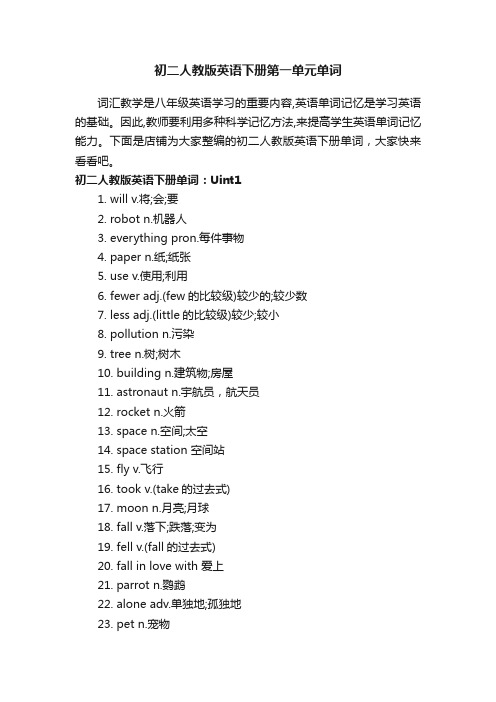
初二人教版英语下册第一单元单词词汇教学是八年级英语学习的重要内容,英语单词记忆是学习英语的基础。
因此,教师要利用多种科学记忆方法,来提高学生英语单词记忆能力。
下面是店铺为大家整编的初二人教版英语下册单词,大家快来看看吧。
初二人教版英语下册单词:Uint11. will v.将;会;要2. robot n.机器人3. everything pron.每件事物4. paper n.纸;纸张5. use v.使用;利用6. fewer adj.(few的比较级)较少的;较少数7. less adj.(little的比较级)较少;较小8. pollution n.污染9. tree n.树;树木10. building n.建筑物;房屋11. astronaut n.宇航员,航天员12. rocket n.火箭13. space n.空间;太空14. space station 空间站15. fly v.飞行16. took v.(take的过去式)17. moon n.月亮;月球18. fall v.落下;跌落;变为19. fell v.(fall的过去式)20. fall in love with 爱上21. parrot n.鹦鹉22. alone adv.单独地;孤独地23. pet n.宠物24. probably adv.大概;或许25. suit n.一套衣服26. able adj.能;能够27. be able to 能够……;得以……28. dress v.穿衣29. casually adv.非正式地;随意地30. which pron.哪个;哪几个31. even adv.甚至32. The World Cup 世界杯33. wrote v.(write的过去式)34. myself pron.(反身代词)我自己;我本人35. interview n.面试;面谈36. predict v.预报;预言37. future n.将来;未来38. prediction n.预言;预测39. came v.(come的过去式)40. come true 实现;达到41. Sound n.声音42. Company n.公司43. Thought v.(think的过去式)44. Fiction n.小说45. unpleasant adj.使人不愉快的46. scientist n.科学家47. in the future 未来;将来48. hundreds of 大量;许多49. already adv.早已;已经50. made v.(make的过去式)51. factory n.工厂52. simple adj.简单的;简易的53. such adj.这样的;这种54. bored adj.厌烦的;厌倦的55. everywhere adv.各地;到处56. human n.人;人类57. shape n.外形;形状58. huge n.巨大的;极大的59. earthquake n.地震60. snake n.蛇61. possible adj.可能的62. electric adj.电的;导电的63. toothbrush n.牙刷64. seem v.像是;似乎65. impossible adj.不可能的;不会发生的66. housework n.家务;家务事67. rating n.级别;等级初二人教版英语下册单词(一)1. mad adj.很生气的;气愤的2. anymore adv.再也(不);(不)再;3. snack n.小吃4. direct speech 直接引语5. reported speech 间接引语6. first of all 首先7. message n.消息;信息8. pass on 传递9. suppose v.假定;认为;期望10. be supposed to 被期望或被要求…11. hard-working adj.勤勉的,努力工作的12. do well in 在……方面做得好13. grandfather n.爷爷;外祖父14. in good health 身体健康15. report card 成绩单16. nervous adj.神经紧张的;不安的17. envelope n.信封18. return v.回来;返回19. semester n.学期20. Chinese Young Pioneer 中国少年先锋队21. true adj.真实的22. disappointing adj.使人失望的;令人扫兴的23. lucky adj.幸运的24. copy v.复制;抄袭25. hers pron.(名词性物主代词)她的26. own adj.自己的27. get over 克服;恢复;原谅28. poor adj.贫穷的;穷困的29. village n.乡村30. Peking University 北京大学31. graduate n.大学毕业生32. volunteer n.志愿者33. The Ministry of Education 教育部34. rural adj.乡下的,乡村的35. area n.地区;地域36. meter n.米;公尺37. sea level 海平面38. thin adj.稀薄的39. ate v.(eat的过去式)40. fortunately adv.幸运地41. decision n.决定;决心42. husband n.丈夫43. dormitory n.宿舍44. senior high school 高中45. Open up 打开46. start n.开始;开端47. influence n.影响48. return v.回来;返回49. hometown n.家乡;故乡50. care for 照料;照顾51. border n.边界,边境52. UNICEF(United Nations International Children’s Emergency Fund) addr.联合国儿童基金会53. WWF(World Wildlife Fund) abbr.世界野生动物基金会54. Greenpeace “绿色和平”组织55. danger n.危险初二人教版英语下册单词(二)1. have a great time 玩的愉快2. organize v.组织3. take away 拿走4. clean-up 清除;打扫5. flower n.花6. agent n.代理人;代理商7. around the world 在世界各地8. make a living 谋生9. Against prep.反对10. charity n.慈善团体;慈善事业11. chance n.机会;机遇12. all the time 一直13. injured adj.受伤的;受损害的14. sincerely adv.真诚地15. lawyer n.律师16. tonight n.今晚;今夜17. mobile phone 移动电话。
专练04:词汇运用-2020-2021学年下学期八年级英语期末复习题型专项训练(人教版)
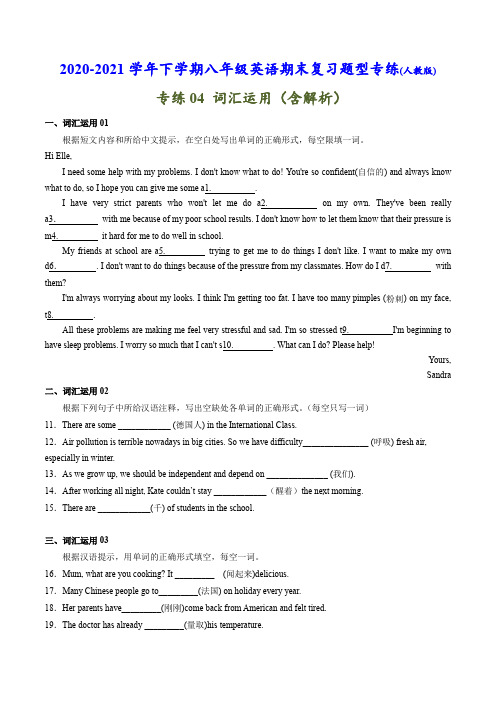
2020-2021学年下学期八年级英语期末复习题型专练(人教版)专练04 词汇运用(含解析)一、词汇运用01根据短文内容和所给中文提示,在空白处写出单词的正确形式,每空限填一词。
Hi Elle,I need some help with my problems. I don't know what to do! You're so confident(自信的) and always know what to do, so I hope you can give me some a1. .I have very strict parents who won't let me do a2. on my own. They've been really a3.with me because of my poor school results. I don't know how to let them know that their pressure is m4. it hard for me to do well in school.My friends at school are a5. trying to get me to do things I don't like. I want to make my own d6.. I don't want to do things because of the pressure from my classmates. How do I d7. with them?I'm always worrying about my looks. I think I'm getting too fat. I have too many pimples (粉刺) on my face, t8. .All these problems are making me feel very stressful and sad. I'm so stressed t9. I'm beginning to have sleep problems. I worry so much that I can't s10. . What can I do? Please help!Yours,Sandra 二、词汇运用02根据下列句子中所给汉语注释,写出空缺处各单词的正确形式。
人教版八年级英语下册Unit 1 What's the matter 词汇短语知识点总结梳理(共1
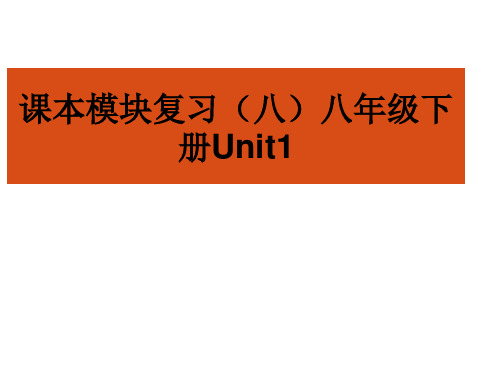
A. what
B. when
C. who
D. how
( D) 2. Please don’t do homework and watch TV_______.
A. from time to time B. all the time
C. at times D. at the same time
课本模块复习(八)八年级下册Unit1
形容词.adj
1.生病的 sick
2.孤单的lonely 3.强壮的strong
4.sore疼痛的
3.trouble问题 4.护士nurse
名词.n
5. rest休息 6.accident意外 7.situation情况 8.decision决定 9.importance重要性
10.death死亡
代词pron
D. provide
课本模块复习(八)八年级下册Unit1
( A) 6. I’ll help ________the city parks on Volunteer Day.
A. clean upB. eat up C. dry up
D. use up
(D) 7. If you like to help the homeless people you can ________food at the food bank.
care for
make see
make sure确定
get up起床
make a face做鬼脸
get
make friends with与…做朋友
make up of构成 make up one's mind下决心
get together聚会 get on with sb与…某人相处 get on上车 get off下车 get down降下
八年级下册英语单词1~10单元人教版

八年级下册英语单词1~10单元人教版一、Unit 11. career2. ambulance3. challenge4. suffer5. volunteer6. deserve7. qualify8. education9. tr本人ning10. employment在八年级下册英语中,第一个单元涉及了一些关于职业和救援的单词。
通过学习这些单词,学生们可以了解到不同的职业和工作环境,以及在紧急情况下如何进行救援。
二、Unit 21. lava2. erupt3. disaster4. erupt5. ash6. volcano7. peak8. prediction9. zone10. risk第二个单元主要是关于自然灾害的单词。
学生们通过学习这些单词,可以了解到火山喷发的过程以及相关的预测和风险。
三、Unit 31. individual2. respect3. ignore4. participate5. appropriate6. avoid7. presence8.munity9. organize10. influence这个单元主要是关于人际交往和社会互动的单词。
学生们可以了解到如何与他人相处,尊重他人,参与社区活动并影响他人。
四、Unit 41. coach2. sportswear3. launch4. teamwork5. score6. athlete7. cheer8. champion9. record10. entert本人nment这个单元主要是关于体育运动和运动员的单词。
学生们可以学习到与体育相关的词汇,并了解到团队合作和竞技精神的重要性。
五、Unit 52. behavior3. value4. moral5. respect6. principle7. individual8. honesty9. sympathy10. considerate第五个单元是关于品德和道德的单词。
八年级下人教版英语单词

八年级下人教版英语单词Unit 11.adventure 冒险2.challenge 挑战3.explorer 探险家4.journey 旅行5.luggage 行李6.package 包裹7.passport 护照8.souvenir 纪念品9.tour 导游10.t rip 旅行Unit 21.annoy 使生气2.apologize 道歉3.blame 责备plain 抱怨5.criticize 批评6.embarrass 使尴尬7.insult 侮辱8.offend 冒犯9.respect 尊重10.t rust 信任Unit 31.athlete 运动员2.champion 冠军3.coach 教练pete 竞争5.event 项目6.fan 粉丝7.match 比赛8.referee 裁判9.score 得分10.s tadium 体育场Unit 41.advantage 优势2.benefit 利益3.charity 慈善机构4.donate 捐赠5.generous 慷慨的6.improve 改善7.income 收入8.poverty 贫穷9.support 支持10.v olunteer 志愿者Unit 51.ancient 古代的2.architecture 建筑3.culture 文化4.emperor 皇帝5.history 历史ndmark 地标7.monument 纪念碑8.palace 宫殿9.site 地点10.t ourist attraction 旅游胜地Unit 61.behavior 行为2.bully 欺负3.challenge 挑战4.conflict 冲突5.ignore 忽视6.influence 影响7.peer 同龄人8.respect 尊重9.self-esteem 自尊心10.s ocial 社交的。
人教版英语新目标八年级下第一单元教材词汇及搭配讲解

Unit1What's the matter?Section A【教材和课标共有单词】1.matter(n.)问题;事情*What’s the matter (with sb./sth.)(某人/某物)怎么了?/出什么事情了?→(同义句型)→*What’s wrong (with sb./sth.)?→*What’s the trouble (with sb./sth.)?→*What happened(to sb./sth.)?→*Is there anything wrong (with sb./sth.) ?*It doesn’t matter. 没关系。
*as a matter of fact事实上2.stomachache(n.)胃疼;腹痛*have a stomachache胃疼3.foot (n.)脚;足→feet(pl.)*on foot步行4.neck (n.)颈;脖子5.stomach (n.)胃;胃部→stomachs (pl.)6.fever (n.)发烧*have a fever发烧→*take one’s temperature (量体温)7.lie(v.)躺;平躺;存在;处于→lay(过去式)→lying(现在分词)*lie down躺下*lie on the side of the road躺在路边*lie in bed卧床*lie in the south of China位于中国南部→(v.)说谎→lied(过去式)*lie to sb.向某人说谎→(n.)谎言→lies(pl.)*tell lies/tell a lie撒谎*tell a white lie撒一个善意的谎言8.rest(v/n.)放松;休息*take/have a rest休息9.cough(v/n.)咳嗽*have a cough咳嗽10.X-ray(n.)X射线;X光*get an X-ray拍X光片11.toothache (n.)牙疼*have a toothache牙疼12.headache(n.)头疼*h ave a headache 头疼13.passenger(n.)乘客→passengers (pl.)*most passengers/most of the passengers大部分乘客*all the passengers/all of the passengers全部乘客14.off (adv./prep.) 离开(某处);不工作;从......去掉→(有关off短语)*get off下车*cut off切除;切断;阻隔*give off散发;放出(气味、光、热等)*put off推迟*set off出发;启程*show off炫耀*turn off关闭*take off脱掉;起飞15.*to one’s surprise使......惊讶的是;出乎......的意料→(n.)惊奇;惊讶(v.)使惊奇;使诧异surprise(n./v.)→(adj.)令人吃惊的surprising(修饰物)→(adj.)感到吃惊的surprised(修饰人)*get a surprise吃一惊*to one’s surprise令人吃惊的是*give sb. a (big) surprise给某人一个(大)惊喜*have a surprise party举行一场惊喜派对*surprise sb.使某人诧异*in surprise吃惊地*be surprised to do sth.做某事感到惊讶*be surprised at sth.对某物感到惊讶16.trouble(n.)问题;苦恼*in trouble在困境中*have trouble with sth.在某事上有困难*have trouble (in) doing sth.在做某事上有困难17.hit (v.)(用手或器具)击;打(n.)红极一时的人或事物→hit(过去式)→hitting(现在分词)*get/be hit by a ball被球击中*get hit on the head头部受到撞击*hit an old man撞到一位老人18.*right away立即;马上→at once (同义短语)→right now (同义短语)→in a minute (同义短语)19.*get into陷入;参与→*get into trouble(惹麻烦)*get into a car/a taxi(进入小汽车/出租车)20.herself (pron.)(she的反身代词)她自己【教材独有单词】21.sore (adj.) 疼痛的;酸疼的22.throat (n.) 咽喉;喉咙*have a sore throat喉咙疼23.onto (prep.) 朝;向*move the man onto the bus把这个人抬上公交车Unit1What's the matter?Section B【教材和课标共有单词】24.sick (adj.)生病的;有病的→ill (adj.近义词)→sickness/illness(n.) 疾病*fall/be/get sick/ill生病*a sick kid一个生病的孩子25.knee (n.)膝;膝盖26.ourselves (pron.)(we的反身代词)我们自己*help ourselves to sth.(我们)随便享用某物*enjoy ourselves(我们)玩的开心27.*get/be used to (doing) sth.习惯于(做)某事;适应于(做)某事→*used to (do sth.)过去常常(做某事);曾经(做某事)28.risk (n./v.) 危险;风险;冒险*take a risk/risks冒险*risk one’s life(to do sth.)冒着生命危险(去做某事)29.situation(n.)情况;状况*be in a difficult situation处于困境之中*be in a dangerous situation处于险境之中30.kilo(n.)千克;公斤→kilos(复数)*5 kilos of tomatoes五千克西红柿*a 360-kilo rock一块360公斤的石头31.rock (n.)岩石;摇滚乐→rocky(adj.)多岩石的;岩石的*rock climbing攀岩32.*run out用尽;耗尽=*use up(同义短语)→*sb.run out of sth.某人用光某物→*sth.run out某物被用光33.knife(n.)刀→knives(pl.)34.blood (n.)血*lose too much blood失去太多血35.mean (v.)意思是;意欲;打算→meant (过去式)→meaning (n.意思;意义)→meaningful (adj.有意义的)→meaningless (adj.无意义的)*mean to do sth.打算做某事*mean doing sth.意味着做某事*the meaning of life生活的意义;人生的意义*What’s the meaning of...?......的意思/意义是什么?=*What does...mean?36.decision (n.)决定;抉择*make a (good) decision做一个(好的)决定*make a decision to do sth.决定做某事*make one’s own decision自己做决定→decide (v.)决定*decide (not) to do sth.决定(不)做某事*decide on sth.决定某事37.control (n./v.) 限制;约束;管理*be in control of 掌管;管理36.spirit (n.)勇气;意志*be in good/high spirits兴高采烈38.*give up放弃→give up (doing) sth.放弃(做)某事→give it/them up放弃它/它们39.nurse (n.)护士【教材独有单词】40.bandage(n./v.) 绷带;用绷带包扎*bandage oneself给自己绑上绷带*put a bandage on the cut用绷带包扎伤口41.press (v.) 压;挤;按*press the sides of your nose压你的鼻子的两侧42.nosebleed (n.)鼻出血*have a nosebleed流鼻血43.breathe (v.)呼吸→breath (n.)呼吸*take a breath呼吸*have problems/trouble/difficulty breathing呼吸困难*out of breath上气不接下气44.sunburned (adj.)晒伤的*get sunburned晒伤45.climber(n.)登山者;攀登者→climb (v.)攀登;爬*mountain climbing登山运动*as a mountain climber作为一名登山者46.accident (n.)(交通)事故;意外遭遇*have an accident经历一场事故47.importance(n.)重要性→important (adj.)重要的*the importance of (doing) sth.(做)......的重要性*be of (great) importance(非常)重要48.death(n.)死;死亡→die (v.)死亡;消失;灭亡→dead (adj.)死的;无生命的→dying (adj.)奄奄一息的*die of死于(内因,如饥饿,年老,疾病)*die from死于(外因,如事故,刀伤,污染)*die out灭绝*die down逐渐变弱;逐渐消失。
Unit1-5重点词汇短语 人教版英语八年级下册

1.问题;事情 n.matter2.胃痛;腹痛 n. stomachache3.颈;脖子 n. neck4.发烧 n. fever5.乘客;旅客 n. passenger6.问题;苦恼;n. 劳驾;麻烦v. trouble7.膝;膝盖 n. knee8.情况;状况 n. situation9.岩石 n.rock10.血 n.blood11.勇气;意志;本质;精髓 n.spirit12.护士 n.nurse13.放松;休息;v.&n. 残留 n. rest14.咳嗽 n.&v. cough15.危险;风险;冒险 n.&v.risk16.咽喉;喉咙 n. throat17.死;死亡 n. deathUnit 2重点词汇1.标志;信号 n.sign2.(尤指长途)旅行;行程 n. journey3.车轮;轮子 n. wheel4.信;函;字母n. letter5.募集;征集 v. raise6.修理;修补 v. repair7.修理;安装 v. fix8.瞎的;失明的 adj. blind9.聋的 adj. deaf10.聪明的;聪颖的 adj. clever11.独自;单独 adv. alone12.几个;数个;一些 pron. several13.通知;通告;注意 n.注意到;意识到 v. notice14.高兴;愉快 n.joy15.夫人;女士n. madam16.义务做;自愿做 v. 志愿者 n. volunteer1.垃圾;废弃物 n. rubbish2.地板;楼层 n. floor3.杂乱;不整洁n. mess4.衬衫 n. shirt5.手指 n. finger6.邻居 n.neighbor7.给;递;走过;通过 v. pass8.借;借用 v.borrow9.厌恶;讨厌 v. hate10.也不 adv.两者都不pron. neither11.与…同时;当…的时候;而;然而conj. while12.因为;既然 conj. 从…以后;自…以来 prep., conj. & adv. sinceUnit 4重点词汇1.成员;分子 n. member2.允许;准许 v.allow3.猜测;估计 v. guess4.主动提出;自愿给予 v.offer5.抄袭;模仿;复制;复印 v. copy6.归还;回来;返回 v. return7.持续;继续存在 v. continue8.鞭策;督促;推动 v. push9.造成;引起 v.cause10.有毛病;错误的 adj. wrong11.焦虑的;担忧的 adj.nervous12.代替;反而;却 adv.instead13.可能;大概;也许 adv.perhaps14.压力 n. pressure15.意见;想法;看法 n. opinionUnit 5重点词汇1.暴风雨 n. rainstorm2.地域;地区 n. area3.窗;窗户 n. window4.章节;段落 n. passage5.学生 n.pupil6.日期;日子n. date7.塔,塔楼 n.tower8.敲打;打败 v. beat9.理解;领会;认识到v.realize10.奇特的;奇怪的 adj.strange11.睡着 adj. asleep12.倚;碰;撞;反对;逆 prep. against13.闹钟 n.alarmUnit 1-5 重点短语1.躺下 lie down2.放弃 give up3.陷入困境 get into trouble4.用尽;耗尽 run out (of)5.冒险 take risks / take a risk6.习惯于…;适应于… be/get used to7.打扫(或清除)干净 clean up8.使她变得高兴/振奋起来 cheer her up9.推迟 put off10.参加…选拔;试用 try out11.修理;装饰 fix up12.赠送;捐赠 give away13.建起;设立 set up14.想出;提出 come up with15.有影响;有作用 make a difference16.依靠他人;信赖他人 depend on others17.照顾好你自己 take good care of yourself18.快速查看报纸;浏览报纸 look through the newspaper19.解决问题 work out the problem20.和他们和睦相处 get on/along with them21.依我看 in my opinion22.一…就… as soon as23.(闹钟)六点发出响声 go off at six o’clock24.接电话 pick up (the phone)25.进入梦乡 fall asleep26.起初;起先 at first27.沉默;无声 in silence28.代替;反而 instead of。
人教版(新目标)初中英语八年级下册Unit 1
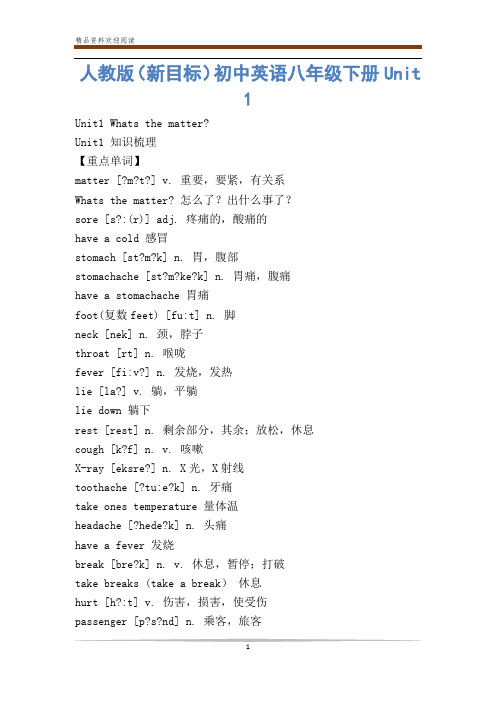
人教版(新目标)初中英语八年级下册Unit1Unit1 Whats the matter?Unit1 知识梳理【重点单词】matter [?m?t?] v. 重要,要紧,有关系Whats the matter? 怎么了?出什么事了?sore [s?:(r)] adj. 疼痛的,酸痛的have a cold 感冒stomach [st?m?k] n. 胃,腹部stomachache [st?m?ke?k] n. 胃痛,腹痛have a stomachache 胃痛foot(复数feet) [fu:t] n. 脚neck [nek] n. 颈,脖子throat [rt] n. 喉咙fever [fi:v?] n. 发烧,发热lie [la?] v. 躺,平躺lie down 躺下rest [rest] n. 剩余部分,其余;放松,休息cough [k?f] n. v. 咳嗽X-ray [eksre?] n. X光,X射线toothache [?tu:e?k] n. 牙痛take ones temperature 量体温headache [?hede?k] n. 头痛have a fever 发烧break [bre?k] n. v. 休息,暂停;打破take breaks (take a break)休息hurt [h?:t] v. 伤害,损害,使受伤passenger [p?s?nd] n. 乘客,旅客off [?f] adv. prep. 离开(某处);从去掉get off 下车to ones surprise 使惊讶,出乎意料onto [nt?] prep. 向,朝trouble [?tr?bl] n. 麻烦,烦扰,问题hit [hit] n. v. 碰撞,打,打击right away 立即,马上get into 陷入,参与herself [h?:?self] pron. 她自己,她本身(she的反身代词)bandage [b?nd?d?] n. v. 绷带;用绷带包扎sick [s?k] adj. 患病的,不适的knee [ni:] n. 膝盖nosebleed [?nzbli:d] n. 鼻出血breathe [bri:e] v. 呼吸sunburned [?s?nb?:nd] adj. 晒伤的ourselves [ɑ:?selvz] pron. 我们自己(we的反身代词)climber [?kla?m?(r)] n. 登山者be used to 习惯于适应于risk [r?sk] n. v. 风险,危险;冒险take risks (take a risk) 冒险accident [ksid?nt] n. 意外事件;事故situation [?sitju?ein] n. 状况,形式,情况kg=kilogram [?k?l?gr?m] n. 公斤,千克rock [r?k] n. 岩石run out (of) 用尽,耗尽knife [naif] n. 刀,餐刀cut off 切除blood [bl?d] n. 血mean [mi:n] v. 意味着,意思是,意欲get out of 离开,从出来importance [?m?p?:tns] n. 重要性decision [d?sn] n. 决心,决定,抉择control [k?ntrl] v. 控制,支配,操纵be in control of 掌管,管理spirit [sp?r?t] n. 勇气,意志death [de] n. 死亡give up 放弃nurse [n?:s] n. 护士【重点短语】1.have a fever 发烧2.have a cough 咳嗽3.have a toothache 牙疼4.talk too much 说得太多5.drink enough water 喝足够的水6.have a cold 受凉;感冒7.have a stomachache 胃疼8.have a sore back 背疼9.have a sore throat 喉咙痛10. take risks 冒险11.hot tea with honey 加蜂蜜的热茶12.see a dentist 看牙医13.get an X-ray 拍X 光片14.take one s temperature 量体温15.put some medicine on sth. 在上面敷药16. give up 放弃17. sound like 听起来像18. all weekend 整个周末19. in the same way 以同样的方式20. go to a doctor 看医生21. go along 沿着走22. on the side of the road 在马路边23. shout for help 大声呼救24. without thinking twice 没有多想25. get off 下车26. have a heart problem 有心脏病27. to one s surprise 另某人惊讶的是28. thanks to 多亏了;由于29. in time 及时30. make a decision 做出决定31. get into trouble 造成麻烦32. right away 立刻;马上33. because of 由于34. get out of 离开;从出来35. keep on doing sth. 继续或坚持做某事36. put a bandage on sth. 用绷带包扎37. fall down 摔倒38. feel sick 感到恶心39. have a nosebleed 流鼻血40. cut his knee 割伤他的膝盖41. put her head back 把她的头向后仰42. have problems breathing 呼吸困难43. mountain climbing 登山运动44. be used to doing sth. 习惯做某事45. run out (of) 用完;用尽46. so that 以便47. so...that... 如此以至于...48. be in control of 掌管;管理49. in a difficult situation 在闲境中【重点句型】1. Whats the matter with you?= Whatthe trouble with you?= Whats wrong with you? 你怎么了?2. What should she do? 她该怎么办呢?3.Should I take my temperature? 我应该量一下体温吗?4.You should lie down and rest. 你应该躺下休息一会儿。
八年级下册英语词汇表人教版
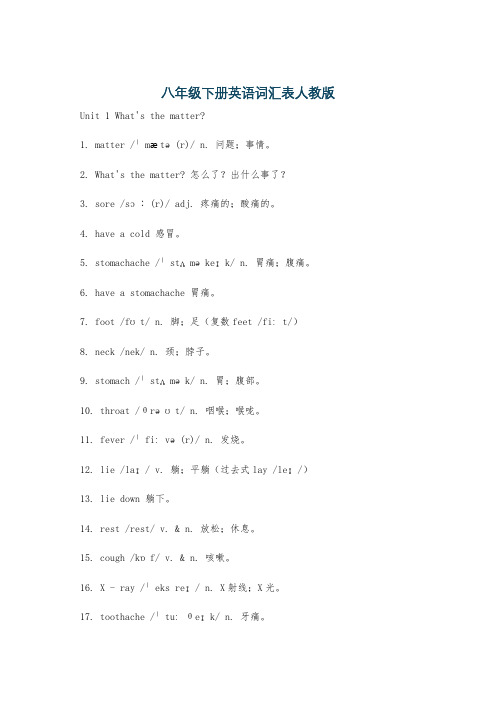
八年级下册英语词汇表人教版Unit 1 What's the matter?1. matter /ˈmætə(r)/ n. 问题;事情。
2. What's the matter? 怎么了?出什么事了?3. sore /sɔː(r)/ adj. 疼痛的;酸痛的。
4. have a cold 感冒。
5. stomachache /ˈstʌməkeɪk/ n. 胃痛;腹痛。
6. have a stomachache 胃痛。
7. foot /fʊt/ n. 脚;足(复数feet /fiːt/)8. neck /nek/ n. 颈;脖子。
9. stomach /ˈstʌmək/ n. 胃;腹部。
10. throat /θrəʊt/ n. 咽喉;喉咙。
11. fever /ˈfiːvə(r)/ n. 发烧。
12. lie /laɪ/ v. 躺;平躺(过去式lay /leɪ/)13. lie down 躺下。
14. rest /rest/ v. & n. 放松;休息。
15. cough /kɒf/ v. & n. 咳嗽。
16. X - ray /ˈeks reɪ/ n. X射线;X光。
17. toothache /ˈtuːθeɪk/ n. 牙痛。
18. take one's temperature 量体温。
19. headache /ˈhedeɪk/ n. 头痛。
20. have a fever 发烧。
21. break /breɪk/ n. & v. 间歇;休息;打破(过去式broke /brəʊk/)22. take breaks (take a break) 休息。
23. hurt /hɜːt/ v. (使)疼痛;受伤(过去式hurt)24. passenger /ˈpæsɪndʒə(r)/ n. 乘客;旅客。
25. off /ɒf/ adv. & prep. 离开(某处);不工作;从……去掉。
八年级英语下册 Unit1 核心词汇

八年级英语下册Unit1核心词汇教材核心词汇知识链接及典例解读一、used to曾经教材原句You used to share food with me!你过去常与我分享食物!背例句学搭配His parents used to live in the countryside.他的父母过去住在乡下。
固定搭配used to do sth. 意为“过去经常做某事,以前常常做某事”,表示过去的习惯。
本身已是过去时态,没有人称和数的变化,暗含现在已不再如此。
易混辨析be used to doing sth.习惯于做某事My father is used to reading newspapers after dinner.我父亲习惯晚饭后读报。
be used to do 被用来做……A pen is used to write with.笔是用来写的。
典例解读1.My father _____________in a small village when he was a small child.A.used to living B.was used to liveC.used to live D.use to live【答案】C【解析】句意:我父亲小时候住在一个小村庄。
be used to doing sth.习惯于做某事,used to do sth.过去常常做某事,固定搭配。
根据时间状语从句when he was a small child可知,此处是“我父亲过去常常住在一个小村庄。
故选C。
2.My father _______ working on the farm, but he is a driver now.A.is used to B.was used to C.used to D.gets used to【答案】B【解析】句意:我父亲过去在农场工作,但他现在是一名司机。
根据but he is a driver now 可知,前面应该是表示过去发生的事情,排除A和D;be used to doing sth.习惯于做某事,used to do sth.过去常常做某事,固定搭配。
人教版八年级下册英语Unit 1单项选择专项练习和词汇运用专项练习(含答案)
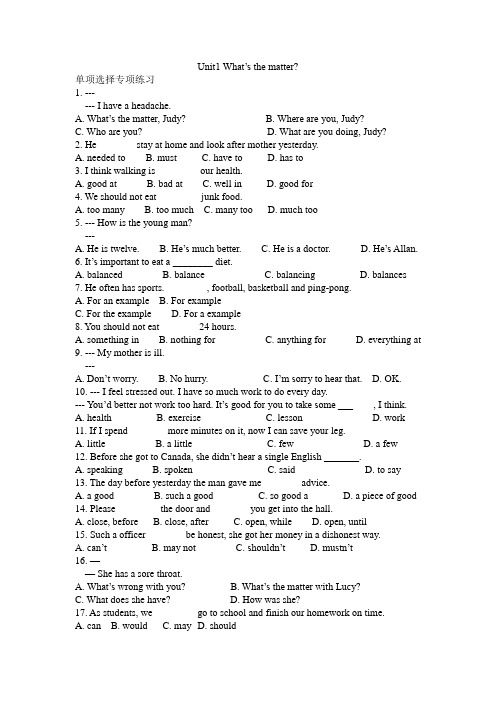
Unit1 What’s the matter?单项选择专项练习1. --- _________--- I have a headache.A. What’s the matter, Judy?B. Where are you, Judy?C. Who are you?D. What are you doing, Judy?2. He _______ stay at home and look after mother yesterday.A. needed toB. mustC. have toD. has to3. I think walking is ________ our health.A. good atB. bad atC. well inD. good for4. We should not eat ________ junk food.A. too manyB. too muchC. many tooD. much too5. --- How is the young man?--- ______A. He is twel ve.B. He’s much better.C. He is a doctor.D. He’s Allan.6. It’s important to eat a ________ diet.A. balancedB. balanceC. balancingD. balances7. He often has sports. ________, football, basketball and ping-pong.A. For an exampleB. For exampleC. For the exampleD. For a example8. You should not eat _______ 24 hours.A. something inB. nothing forC. anything forD. everything at9. --- My mother is ill.--- ______A. Don’t worry.B. No hurry.C. I’m sorry to hear that.D. OK.10. --- I feel stressed out. I have so much work to do every day.--- You’d bet ter no t work too hard. It’s good for you to take some _______, I think.A. healthB. exerciseC. lessonD. work11. If I spend _______ more minutes on it, now I can save your leg.A. littleB. a littleC. fewD. a few12. Before she got to Cana da, she didn’t hear a single English _______.A. speakingB. spokenC. saidD. to say13. The day before yesterday the man gave me _______ advice.A. a goodB. such a goodC. so good aD. a piece of good14. Please ________ the door and _______ you get into the hall.A. close, beforeB. close, afterC. open, whileD. open, until15. Such a officer _______ be honest, she got her money in a dishonest way.A. can’tB. may notC. shouldn’tD. mustn’t16. — ____________________— She has a sore throat.A. What’s wrong with you?B. What’s the matter with Lucy?C. What does she have?D. How was she?17. As students, we ________ go to school and finish our homework on time.A. canB. wouldC. mayD. should18. Although you want to be thinner, you should not eat _______ 24 hours.A. something inB. anything afterC. nothing forD. everything at19. — I have a toothache.— You should ______.A. eat somethingB. have a restC. eat some chocolateD. see a dentist20. —I’m ______. May I have something to drink?— Yes, here you are.A. thirstyB. hungryC. tiredD. sad21. — I hope you feel better.— _________________.A. Yes, I think soB. I’m glad to hear that.C. Thank you.D. That sounds great.22. He often has sports. ________, football, basketball and ping-pong.A. For an exampleB. For exampleC. For the exampleD. For a example23. — ______ is very important for us to learn English well.— You are right.A. ThisB. ThatC. ItD. Everyone24. There is something wrong with my ______. I can’t see the blackboard clearly.A. eyesB. headC. earsD. teeth25. — Linda is ______ heavy.— I agree. I think she should not eat ______ junk food.A. too much; much tooB. much too; too manyC. too much; too manyD. much too; too much26. — Is Mr Zhang really very ill?—______. He’s in hospital.A. I don’t think soB. I don’t knowC. I hope soD. I’m afraid so27. ______ some juice every day is good for our health.A. DrinkB. DrinkingC. DrinksD. Don’t drink28. We should eat more vegetables ______.A. to stay healthB. to keep healthC. to keep healthyD. staying healthy29. The English novel is quite easy for you, because there are ______ new words in it.A. fewB. a fewC. littleD. a little30. — How is the young man?— ______A. He is twelve.B. He’s much better.C. He is a doctor.D. He’s Allan.31. My cousin is________heavy because he eats________fast food.A. too much; too manyB. too many; too muchC. much too; too muchD. too much; much too32. --Jenny, do you want to be a doctor in the future?--No. My mom expects me________a doctor but I want to be a teacher.A. beB. isC. wasD. to be33. --What should I do?--You should drink some tea________honey and get________X-ray at once.A. in; aB. with; aC. in; anD. with; an34. The old man had a heart problem and needed________to the hospital right away.A. goingB. to goC. wentD. goes35. --Do you like the songs by Taylor Swift?--Yes. Country music________nice and is full of feelings.A. soundsB. listensC. hearsD. looks36. --I have a________.--You should take your temperature.A. feverB. headacheC. sore throatD. sore back37. Humans cannot make progress________dreams.A. withB. withoutC. throughD. about38. I took the subway and________at the downtown station.A. got throughB. got overC. got onD. got off39. ________the kind driver, the old man was saved by the doctors.A. Thanks forB. Thanks soC. Thank you forD. Thanks40. --About 20 million people in the world have no enough safe drinking water.--So we should________how to deal with the problems of water.A. put onB. look afterC. think aboutD. get on with41. He drove so fast at the turn that the car almost went________the road.A. offB. onC. alongD. behind42. The baby is too young. Don’t leave her at home by________.A. sheB. herC. hersD. herself43. ________a teacher, he loves his students very much.A. ForB. AsC. WithD. About44. --The oil on the earth will________one day.--I think so. We should make good use of it.A. find outB. work outC. give outD. run out45. The two companies decided to work together________they had common interests.A. becauseB. unlessC. butD. or46. --Can I help you?--I want to buy________.A. two kilos meatB. two kilos of meatC. two kilo meatsD. two kilos of meats47. --I heard that Paul hurt himself badly in the earthquake.--Yes. The doctor had to________his right leg to save him.A. cut upB. cut outC. cut offD. cut down48. --Put this medicine________your cut. It’ll stop the bleeding.--It’s kind of you. Thank you.A. inB. onC. withD. to49. Our teachers and parents will be proud of us because we have grown up and can be responsible for________.A. themselvesB. ourselvesC. yourselvesD. yourself50. His love for mountain climbing is so great that he keeps on________mountains even after this experience.A. to climbB. climbC. climbingD. climbed51. --Jack, why have you decided________Chinese folk music as a course?--To learn more about Chinese culture.A. takeB. takenC. takingD. to take52. Miss Li likes swimming very much and now she________on Saturday afternoons.A. used to swimB. is used to swimC. is used to swimming53. --Hi, Bob. You don’t look well. What’s the matter________you?--I talked too much and didn’t have any water last night. I have a sore throat now.A. inB. ofC. with54. --You look sad, Betty. What’s wrong?--________.A. I’ve got first prizeB. I’m sorry to hear thatC. I can’t attend the summer campD. I don’t quite agree with you55. He has________homework to do and he is________worried.A. too much; too muchB. too many; too muchC. too much; much tooD. too many; much too56. My sister is________busy because she often has________work.A. too much; too manyB. too many; too muchC. much too; too muchD. too much; much too57. I think tea will taste better________some milk in it.A. forB. withC. fromD. at58. ________your help, I can’t get good grades.A. WithB. WithoutC. ForD. From59. ________new study shows that going to________bed late is harmful to our health.A. /; /B. A; /C. A; theD. The; the60. I saw her________flowers in the garden when I passed by.A. to waterB. waterC. wateringD. watered61. Every morning, Tim sees groups middle-aged women________at the square.A. danceB. to danceC. dancesD. danced62. Don’t worry about your daughter. She can look after________well.A. herselfB. hersC. herD. she63. --My father________to his workplace by bus, but now he________there by bike. --Really? You have an environmentally friendly father.A. used to go; is used to goB. used to going; is used to goC. is used to go; is used to goingD. used to go; is used to going答案:1-5 AADBB 6-10 ABBCB11-15 DADBD 16-20 BDCDA21-25 CBCAD 26-30 DBCAB31-35 CDDBA 36-40 ABDBC41-45 ADBDA 46-50 BCBBC51-55 DCCCC 56-60 CBBBC61-63 AADUnit1 What’s the matter?词汇运用专项练习根据句子意思和首字母补全单词。
人教版英语八年级下册Unit1 知识点精讲
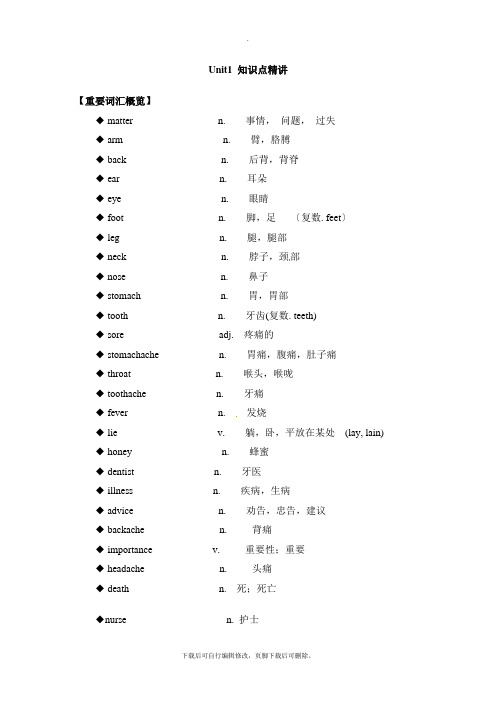
Unit1 知识点精讲【重要词汇概览】◆ matter n.事情,问题,过失◆ arm n.臂,胳膊◆ back n.后背,背脊◆ ear n.耳朵◆ eye n.眼睛◆ foot n.脚,足〔复数. feet〕◆ leg n.腿,腿部◆ neck n.脖子,颈部◆ nose n.鼻子◆ stomach n.胃,胃部◆ tooth n.牙齿(复数. teeth)◆ sore adj.疼痛的◆ stomachache n.胃痛,腹痛,肚子痛◆ throat n.喉头,喉咙◆ toothache n.牙痛◆ fever n.发烧◆ lie v.躺,卧,平放在某处(lay, lain)◆ honey n.蜂蜜◆ dentist n.牙医◆ illness n.疾病,生病◆ advice n.劝告,忠告,建议◆ backache n.背痛◆ importance v. 重要性;重要◆ headache n. 头痛◆ death n. 死;死亡◆nurse n. 护士◆ knife n. (复数.knives)刀【重要词组概览】◆ have a cold患感冒◆ take breaks(take a break) 休息◆ lie down 躺下◆ get off 下车◆ be used to 习惯于...;适应于...◆ on the other hand另一方面◆ get a cold患感冒◆ see a dentist看牙医◆take one’s temperature 量体温◆ make sb sick使某人不舒服(患锁病)◆ have a sore throat嗓子痛◆ have a fever发烧,发热◆ have a toothache牙痛◆ have a backache背痛◆ have a headache头痛◆give up 放弃◆cut off 切除◆get out 〔of〕用尽;耗尽◆take risks〔take a risk〕冒险◆get into 陷入;参与◆right away 立即;马上◆to one’s s urprise 使...惊讶的;出乎...意料【语法知识聚焦】看病需要和医生交流,这是英语口语中必不可少的内容。
Unit1What'sthematter人教版英语八年级下册教案

(3)时态运用:一般现在时和现在进行时在本章节的对话和描述中占有重要地位,教师需重点讲解并指导学生如何在询问和描述身体状况时正确运用这两种时态。
二、核心素养目标
《Unit 1 What's the matter》的教学旨在培养学生的英语学科核心素养,具体目标如下:
1.提升学生的语言能力,通过学习本章内容,使学生能够熟练运用英语询问和描述身体状况,表达关心与建议,提高实际生活中的交际能力;
2.增强学生的文化意识,了解和尊重不同文化背景下对待疾病和身体状况的态度及表达方式;
举例:
-当学生询问他人身体状况时,能使用"What's the matter?"这一核心句型;
-当描述自己或他人身体不适时,能运用"I have a stomachache."、"You have a fever."等句型;
-在给出建议时,可以使用"You should take some medicine."等短语。
四、教学流程
(一)导入新课(用时5分钟)
同学们,今天我们将要学习的是《Unit 1 What's the matter》这一章节。在开始之前,我想先问大家一个问题:“你们在日常生活中是否遇到过朋友或家人身体不适的情况?”比如,朋友突然说肚子疼,你会怎么关心和帮助他们呢?这个问题与我们将要学习的内容密切相关。通过这个问题,我希望能够引起大家的兴趣和好奇心,让我们一同探索如何用英语询问和描述身体状况。
Unit1词汇,短语,语法归纳人教版八年级英语下册

八下 unit 1 语法归纳总结询问某人的健康问题及遇到事情麻烦等常用的表达方式1 What's the matter (with xx)?(某人)怎么了?2 What's wrong (with xx)?(某人)怎么了?3 What's the trouble (with xx)?(某人)怎么了?4 What happened (to xx)?(某人)发生了什么事?5 Are you OK? 你没事吧?6 Is there anything wrong with xx? 某人有什么事吗?练一练: What's the matter with your leg? ﹦________ ________ ________ ________ __________?﹦________ ________ ________ ________ __________?表达身体疼痛或不舒服,可用如下结构1. sb + have/ has + 病症Eg: Sb has/ have a cold/ bad cold/ cough/ fever/ temperature/ nosebleed某人有感冒,重感冒,咳嗽,发烧,出鼻血2.sb + has/have + a + 身体部位 + acheEg: Sb has/have a headache / toothache/ earache/ backache/ heartache/ stomachache 某人头痛,牙痛,耳朵疼,后背痛,心痛,胃痛3. sb + has/ have + a sore +发病部位Eg: Sb has/have a sore throat/ eye/ back/ arm某人嗓子疼,眼睛疼,后背疼,胳膊疼4. sb + has/have a pain (pains) in one's + 身体部位Eg:Sb has/have a pain in sb's head/ neck 某人头痛,脖子痛5. sb的某部位 + hurt(hurts)注:hurt的过去式,过去分词还是hurteg: My head hurts. 我头痛 His legs hurts。
人教版英语八年级下册第1单元重点知识汇总
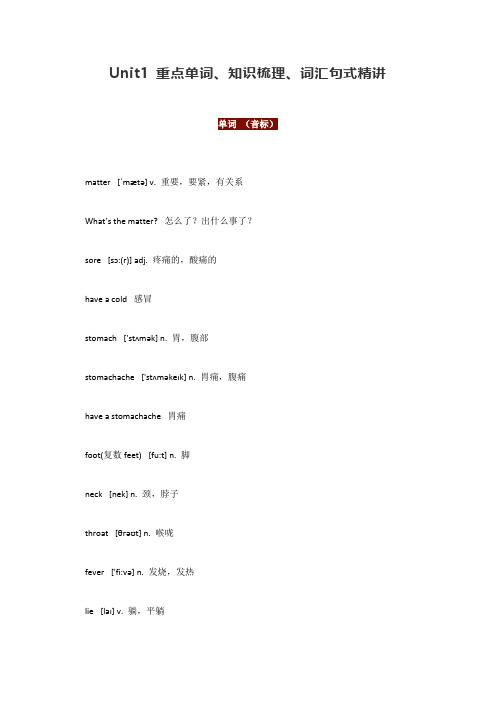
Unit1 重点单词、知识梳理、词汇句式精讲matter [ˈmætə] v. 重要,要紧,有关系What’s the matter? 怎么了?出什么事了?sore [sɔ:(r)] adj. 疼痛的,酸痛的have a cold 感冒stomach ['stʌmək] n. 胃,腹部stomachache ['stʌməkeɪk] n. 胃痛,腹痛have a stomachache 胃痛foot(复数feet) [fu:t] n. 脚neck [nek] n. 颈,脖子throat [θrəʊt] n. 喉咙fever ['fi:və] n. 发烧,发热lie [laɪ] v. 躺,平躺lie down 躺下rest [rest] n. 剩余部分,其余;放松,休息cough [kɒf] n. & v. 咳嗽X-ray ['eksreɪ] n. X光,X射线toothache [ˈtu:θeɪk] n. 牙痛take one's temperature 量体温headache [ˈhedeɪk] n. 头痛have a fever 发烧break [breɪk] n. & v. 休息,暂停;打破take breaks (take a break)休息hurt [hə:t] v. 伤害,损害,使受伤,疼passenger ['pæsɪndʒə] n. 乘客,旅客off [ɒf] adv. prep. 离开(某处);从…去掉get off 下车to one's surprise 使…惊讶,出乎…意料onto [ˈɒntə] prep. 向,朝trouble [ˈtrʌbl] n. 麻烦,烦扰,问题hit [hit] n. & v. 碰撞,打,打击right away 立即,马上get into 陷入,参与herself [hə:ˈself]她自己,她本身(she的反身代词)bandage ['bændɪdʒ] n. & v. 绷带;用绷带包扎sick [sɪk] adj. 患病的,不适的knee [ni:] n. 膝盖nosebleed [ˈnəʊzbli:d] n. 鼻出血breathe [bri:ð] v. 呼吸sunburned [ˈsʌnbɜ:nd] adj. 晒伤的ourselves [ɑ:ˈselvz]我们自己(we的反身代词)climber [ˈklaɪmə(r)] n. 登山者be used to 习惯于… 适应于…risk [rɪsk] n. & v. 风险,危险;冒险take risks (take a risk) 冒险accident [ˈæksidənt] n. 意外事件;事故situation [ˌsitjuˈeiʃən] n. 状况,形式,情况kg=kilogram [ˈkɪləgræm] n. 公斤,千克rock [rɔk] n. 岩石run out (of) 用尽,耗尽knife [naif] n. 刀,餐刀cut off 切除blood [blʌd] n. 血mean [mi:n] v. 意味着,意思是,意欲get out of 离开,从… 出来importance [ɪmˈpɔ:tns] n. 重要性decision [dɪ'sɪʒn] n. 决心,决定,抉择control [kən'trəʊl] v. 控制,支配,操纵be in control of 掌管,管理spirit ['spɪrɪt] n. 勇气,意志death [deθ] n. 死亡give up 放弃nurse [nə:s] n. 护士Judy 朱迪(女名)Nancy 南希(女名)Mandy 曼迪(女名)Aron Ralston 阿伦·罗尔斯顿Utah 尤他州(美国)Unit1 知识梳理【重点单词】matter [ˈmætə] v. 重要,要紧,有关系What’s the matter? 怎么了?出什么事了?sore [sɔ:(r)] adj. 疼痛的,酸痛的have a cold 感冒stomach ['stʌmək] n. 胃,腹部stomachache ['stʌməkeɪk] n. 胃痛,腹痛have a stomachache 胃痛foot(复数feet) [fu:t] n. 脚neck [nek] n. 颈,脖子throat [θrəʊt] n. 喉咙fever ['fi:və] n. 发烧,发热lie [laɪ] v. 躺,平躺lie down 躺下rest [rest] n. 剩余部分,其余;放松,休息cough [kɒf] n. & v. 咳嗽X-ray ['eksreɪ] n. X光,X射线toothache [ˈtu:θeɪk] n. 牙痛take one's temperature 量体温headache [ˈhedeɪk] n. 头痛have a fever 发烧break [breɪk] n. & v. 休息,暂停;打破take breaks (take a break)休息hurt [hə:t] v. 伤害,损害,使受伤passenger ['pæsɪndʒə] n. 乘客,旅客off [ɒf] adv. prep. 离开(某处);从…去掉get off 下车to one's surprise 使…惊讶,出乎…意料onto [ˈɒntə] prep. 向,朝trouble [ˈtrʌbl] n. 麻烦,烦扰,问题hit [hit] n. & v. 碰撞,打,打击right away 立即,马上get into 陷入,参与herself [hə:ˈself] pron. 她自己,她本身(she的反身代词)bandage ['bændɪdʒ] n. & v. 绷带;用绷带包扎sick [sɪk] adj. 患病的,不适的knee [ni:] n. 膝盖nosebleed [ˈnəʊzbli:d] n. 鼻出血breathe [bri:ð] v. 呼吸sunburned [ˈsʌnbɜ:nd] adj. 晒伤的ourselves [ɑ:ˈselvz] pron. 我们自己(we的反身代词)climber [ˈklaɪmə(r)] n. 登山者be used to 习惯于… 适应于…risk [rɪsk] n. & v. 风险,危险;冒险take risks (take a risk) 冒险accident [ˈæksidənt] n. 意外事件;事故situation [ˌsitjuˈeiʃən] n. 状况,形式,情况kg=kilogram [ˈkɪləgræm] n. 公斤,千克rock [rɔk] n. 岩石run out (of) 用尽,耗尽knife [naif] n. 刀,餐刀cut off 切除blood [blʌd] n. 血mean [mi:n] v. 意味着,意思是,意欲get out of 离开,从… 出来importance [ɪmˈpɔ:tns] n. 重要性decision [dɪ'sɪʒn] n. 决心,决定,抉择control [kən'trəʊl] v. 控制,支配,操纵be in control of 掌管,管理spirit ['spɪrɪt] n. 勇气,意志death [deθ] n. 死亡give up 放弃nurse [nə:s] n. 护士【重点短语】1.have a fever 发烧2.have a cough 咳嗽3.have a toothache 牙疼4.talk too much 说得太多5.drink enough water 喝足够的水6.have a cold 受凉;感冒7.have a stomachache 胃疼8.have a sore back 背疼9.have a sore throat 喉咙痛10. take risks 冒险11.hot tea with honey 加蜂蜜的热茶12.see a dentist 看牙医13.get an X-ray 拍X 光片14.take one’ s temperature 量体温15.put some medicine on sth. 在……上面敷药16. give up 放弃17. sound like 听起来像18. all weekend 整个周末19. in the same way 以同样的方式20. go to a doctor 看医生21. go along 沿着……走22. on the side of the road 在马路边23. shout for help 大声呼救24. without thinking twice 没有多想25. get off 下车26. have a heart problem 有心脏病27. to one’ s surprise 另某人惊讶的是28. thanks to 多亏了;由于29. in time 及时30. make a decision 做出决定31. get into trouble 造成麻烦32. right away 立刻;马上33. because of 由于34. get out of 离开;从……出来35. keep on doing sth. 继续或坚持做某事36. put a bandage on sth. 用绷带包扎37. fall down 摔倒38. feel sick 感到恶心39. have a nosebleed 流鼻血40. cut his knee 割伤他的膝盖41. put her head back 把她的头向后仰42. have problems breathing 呼吸困难43. mountain climbing 登山运动44. be used to doing sth. 习惯做某事45. run out (of) 用完;用尽46. so that 以便47. so...that... 如此……以至于...…48. be in control of 掌管;管理49. in a difficult situation 在闲境中【重点句型】1. What's the matter with you?= What'the trouble with you?= What's wrong with you? 你怎么了?2. What should she do? 她该怎么办呢?3.Should I take my temperature? 我应该量一下体温吗?4.You should lie down and rest. 你应该躺下休息一会儿。
八年级下册英语书第1单元单词
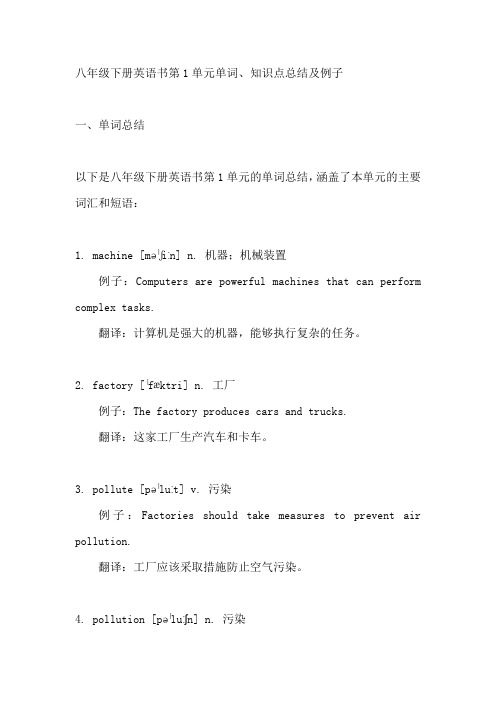
八年级下册英语书第1单元单词、知识点总结及例子一、单词总结以下是八年级下册英语书第1单元的单词总结,涵盖了本单元的主要词汇和短语:1. machine [məˈʃiːn] n. 机器;机械装置例子:Computers are powerful machines that can perform complex tasks.翻译:计算机是强大的机器,能够执行复杂的任务。
2. factory [ˈfæktri] n. 工厂例子:The factory produces cars and trucks.翻译:这家工厂生产汽车和卡车。
3. pollute [pəˈluːt] v. 污染例子:Factories should take measures to prevent air pollution.翻译:工厂应该采取措施防止空气污染。
4. pollution [pəˈluːʃn] n. 污染例子:Water pollution is a serious problem in many developing countries.翻译:水污染是许多发展中国家面临的严重问题。
5. recycle [ˌriːˈsaɪkl] v. 回收利用例子:It's important to recycle paper and plastic to protect the environment.翻译:回收纸张和塑料对保护环境很重要。
6. waste [weɪst] n. 浪费;废弃物例子:Reducing food waste is a crucial step towards sustainability.翻译:减少食物浪费是迈向可持续性的关键一步。
7. problem [ˈprɒbləm] n. 问题;难题例子:Climate change is a global problem that requires international cooperation.翻译:气候变化是一个需要国际合作解决的全球性问题。
人教版八年级下册英语期末复习词汇运用专项练习(含答案)

人教版八年级下册英语期末复习词汇运用专项练习(含答案)1.I want to travel。
especially to English-speaking countries.2.Keeping pets。
such as dogs and cats。
is more and more popular among young and old.3.Have you ever heard of the interesting story?4.Would you mind turning down the music?5.XXX.6.It’s unsafe to let the little kid carry such a heavy box.7.XXX’t come to school because of his illness.8.The plane MH370 XXX.9.A lot of tourists XXX.10.Hurry up。
or we’ll be XXX.11.If you keep on trying。
you’ll succeed one day.12.Don’t worry。
XXX.13.China has XXX.14.XXX’t allow me to go out at night.15.With the development of science。
we can enjoy life better.16.We hope the little girl can tell us the truth.17.You’ll never know unless you try.18.XXX.19.The old man died for unknown reasons.20.XXX France。
so she can speak French.21.I bought a camera last week。
2014年新版人教版八年级英语下册课本Unit1单元词汇
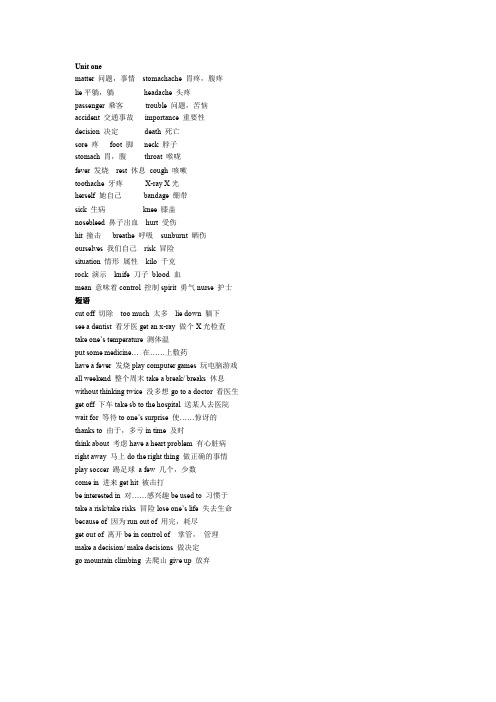
Unit onematter 问题,事情stomachache 胃疼,腹疼lie平躺,躺headache 头疼passenger 乘客trouble 问题,苦恼accident 交通事故importance 重要性decision 决定death 死亡sore 疼foot 脚neck 脖子stomach 胃,腹throat 喉咙fever 发烧rest 休息cough 咳嗽toothache 牙疼X-ray X光herself 她自己bandage 绷带sick 生病knee 膝盖nosebleed 鼻子出血hurt 受伤hit 撞击breathe 呼吸sunburnt 晒伤ourselves 我们自己risk 冒险situation 情形属性kilo 千克rock 演示knife 刀子blood 血mean 意味着control 控制spirit 勇气nurse 护士短语cut off 切除too much 太多lie down 躺下see a dentist 看牙医get an x-ray 做个X光检查take one’s temperature 测体温put some medicine… 在……上敷药have a fever 发烧play computer games 玩电脑游戏all weekend 整个周末take a break/ breaks 休息without thinking twice 没多想go to a doctor 看医生get off 下车take sb to the hospital 送某人去医院wait for 等待to one’s surprise 使……惊讶的thanks to 由于,多亏in time 及时think about 考虑have a heart problem 有心脏病right away 马上do the right thing 做正确的事情play soccer 踢足球a few 几个,少数come in 进来get hit 被击打be interested in 对……感兴趣be used to 习惯于take a risk/take risks 冒险lose one’s life 失去生命because of 因为run out of 用完,耗尽get out of 离开be in control of 掌管,管理make a decision/ make decisions 做决定go mountain climbing 去爬山give up 放弃。
八年级英语下册Unit1 知识梳理(重要句型、重点单词、短语解析及练习)

八年级英语下册Unit1 知识梳理(重要句型、重点单词、短语解析及练习)课文翻译:Section A 会话Role-play the conversation. 角色扮演对话。
Lisa, are you OK? 丽莎,你还好吗?I have a headache and I can't move my neck. 我头痛,我的脖子不能动了。
What should I do? 我头痛,我的脖子不能动了。
Should I take my temperature? 我应该测测体温吗?No, it doesn't sound like you have a fever. 不,你看起来不像是发烧了。
What did you do on the weekend? 你周末做什么了?I played computer games all weekend. 我整个周末都在玩电脑游戏。
That's probably why. 这可能就是你头痛的原因了。
You need to take breaks away from the computer. 你需要休息并且远离电脑。
Yeah, I think I sat in the same way for too long without moving. 是的,我想我是因为以同样的姿势坐的太久没有动。
I think you should lie down and rest. 我想你应该躺下休息。
If your head and neck still hurt tomorrow, then go to a doctor. 如果明天你的头部和颈部还疼,再去看医生。
OK. Thanks, Mandy. 好。
谢谢你,曼蒂。
Section A 短文Read the passage. 阅读下面的短文。
Do you think it comes from a newspaper or a book? 你认为这篇短文是出自一份报纸还是一本书?How do you know? 你是怎么知道的?Bus Driver and Passengers Save an Old Man 公交车司机和乘客救了一位老人At 9:00 a.m. yesterday, bus No. 26 was going along Zhonghua Road when the driver saw an old man lying on the side of the road. 在昨天上午9点,当司机看到一位老人躺在路边,26路公交车正在沿中华路行驶。
- 1、下载文档前请自行甄别文档内容的完整性,平台不提供额外的编辑、内容补充、找答案等附加服务。
- 2、"仅部分预览"的文档,不可在线预览部分如存在完整性等问题,可反馈申请退款(可完整预览的文档不适用该条件!)。
- 3、如文档侵犯您的权益,请联系客服反馈,我们会尽快为您处理(人工客服工作时间:9:00-18:30)。
1
一.根据句意填单词,首字母已给出。
1 . a .
2 a .
3.I a , I a
.
4. , .
5. a c .
6 a .
7 . a .
8. , .
9. ’t a .
10 “A” .
11 .
12 .
13, a .
14 ’s .
15 I ’s .
二.词语运用
1.() .
2.. () .
3.() .
4. . ()
5. ().
2 A
I.根据括号里的汉语提示,填入适当的单词或词组
1 (分发) .
2 (想出,提出)
a .
3 (志愿者) .
4. (写下)a .
5 (
筹集钱) .
.
1. ?
2.. .
3. I , I .
4. ’s a .
5. .
. 根据句意和首字母,填写所缺单词或用括号内所给词的正确形式填空。
1.’s . ’t .
2. a . “ !”
3.() .
4.() ?
5.() a .
B
词汇运用
1 .
2 (想象) .
3 () a .
4.. I’ .
.用所给单词的适当形式填空
1 ().
2. () a .
3. I a ().
4 () .
5 () .
6. ().
7. () a .
8 e a () .
9 . ’s () .
.用所给词的适当形式填空或根据汉语及句意填空。
.
1 () ?
2 () ’s
.
3 () .
4 I ().
5 () .
6 () O’?
7 a (聋子) .
8 (强壮的).
9. (), I .
3
A
I.根据句意及首字母填空
1. ?
2. .
3. . _.
5. .
. 根据句意和首字母,填写所缺单词或用括号内所给词的正确形式填空。
1. a (杂乱) ’ ! ’d .
2 , I () .
3 ().
4 (反复,频繁),’s .
5. —? —I (折叠).
B
I.词汇运用
1.’s s.
2’t ’s a .
3.() .
4. , () a .
5.(邻居)
.词汇运用
1 . s .
2. , .
3. , I’ .
4 (目的是,为了) .
5 , (独立的,自主的)。
6. (提供) .
7. 's a (浪费).
8. ().
9.(扔)a
10 (借).
4
A
根据句意和首字母,填写所缺单词或用括号内所给词的正确形式填空。
1 , .
2 . ’t ’ .
3’t , .
4. (解决) ?
5. (交流,沟通) . 6(任何,每一) , ?
7. , .
8 (关系) .
9 ’s ?
.
10.. .
11.C . ?
12. .
B I.词汇
1’s a () () , .
2. a , ’t .
3 ’t ’s (推) .
4 .
5 I ().
5
A
I.词汇运用
2. I I (睡着) I .
3 (木头)。
4. a (奇怪的) .
5. a () .
. 根据句意和首字母,填写所缺单词或用括号内所给词的正确形式填空。
1. I (突然).
3 a , .
4. (醒来) .
5 () a I .
6 .
7. (逐渐变弱) .
8 (敲打) .
10. (面积,区域) 35 .
B
I. 根据句意和首字母,填写所缺单词或用括号内所给词的正确形式填空。
1 (恐怖分子) .
2. (), I ’t é.
3 (), I .
4’s ?
’s ’ .
.根据句意和首字母,填写所缺单词或用括号内所给词的正确形式填空。
1. ( ) .11, 2001.
2.() I .
3. , a (沉默)。
4. ()
.用括号内所给动词的正确时态填空
1. () .
2. 's () .
3. () .
4. () .
5. I 't , () .
6. () .
7. () a .
8. — () ?
— , .
9. () .
10. I . () a
6
A
I.根据句意和首字母,填写所缺单词或用括号内所给词的正确形式填空
1' (代替) .
2 , ’t .
4 , I .
5 .
6 (使想起).
7’ d () .
8’t (愚蠢的,傻的).
9 (结婚).
10 () 1998.
11 I , () .
12 .
B
1 () .
2. , . ()
3.’t . .
4. () .
7
A
I.根据句意和首字母,填写所缺单词或用括号内所给词的正确形式填空。
2. a .
3. .
4. 2000 s .
5 (西南) .
6 a (成功).
7. b
8 .
9. a 1, 000 .
10 .
11(挑战)。
12’s ’d .
13., () .
14 () .
B
I.词汇运用
1 ’s .
2 ()
3 (石油).
5(出生时), 6 8 .
.词汇运用
1 .
2 ’t ()
3 .
4.I I .
5. 200 .
6 a ().
7 (成功) .
8. .
9 (巨大的).
10 ().
8
A
I.根据句意和首字母,填写所缺单词或用括号内所给词的正确形式填空。
1.I () .
2.2 () a ? .
3 (珍品,财富).
4 . ?
5 a .
6 ( ), .
7 (等待)I ..
8 , a .
B
I.词汇运用
1. a .
2. (成功) .
3 (在国外) ?
4.() .
5. , .
6 ,
7 a I .
8 ’s .
9 .
.
10’s a .
11 ( ) . 'd
12. () . I () .
13. () ? .
.用所给动词的适当形式填空
1 () .
2 () .
3 () ?
4. I () a .
5. () .
5 () ..
9
A
I.词汇运用
1 ?
2 .
3 , I ().
4 () .
5 , ’ (进步)。
.根据句意和首字母,填写所缺单词或用括号内所给词的正确形式填空。
1.—() ?
—, I .
2 , I (社会).
3 .
4’s .
5. I (发明) .
B
I.词汇运用
1 () .
2 () .
3. I (仅仅,只不过) 't .
4 , .
5 .
6 .
.用所给动词的适当形式填空。
1 ’t . I ().
2..-’s .-, I () .
3.. (, ). a ?
4. (, ). a .
5. . . , ().
6. -’s ?-()’ .
7. ’t . (). ().
8. I () a .
9. () ? , () .
10. () a ? , I . I () .
11. a (完美的) .
2 (表演).
10
A
I.词汇运用
1’t . a () .
2 .
3’t . .
4 .
5 60 ()
.用或填空
10. I’.
B
I.词汇运用
1 , .
2 .
3. , .
4.A a .
5. (将……视为) .
6 () .
10 .
11 () a .
12 , a .
13..
.用适当的时态填空
1. () . I () .
2. () ? .
3. () ?
, I () .
4. () .
5. () ?
6. () “ ” ?
7. () ?
8. () .
9. () .
10. I () .
12. I () .
13. 't () .
14. ( ) ? , .
15. () . .
16. ’s ? () ’s .
17. () a ’ .
18. I () I () 1999.
19. I () a .
20. () .
21. () .
22 () .。
